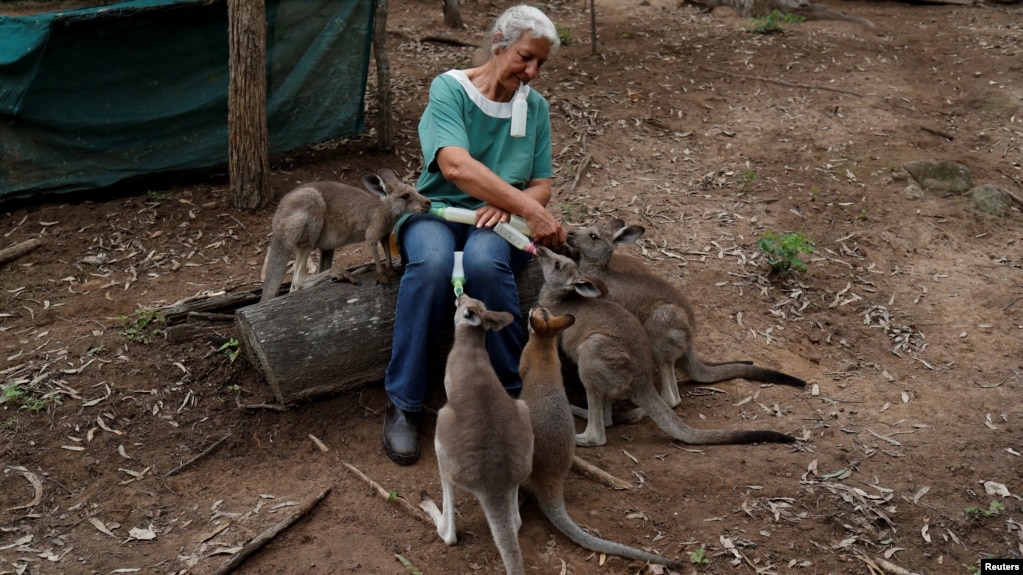A Worthy Cause
"We had way too many animals in the house and around the house so we really couldn't go -- we decided we were going to stay and fight."
"At three o'clock it was a beautiful summer's day, by four o'clock it was midnight. You couldn't see any more than 20 yards and then the firestorm came through and pretty much burned everything."
"It was a horrible thing -- the whole bush has been burnt. It's been vaporized -- it's Vietnam is what it looks like."
"It's not until after the fires when it really hits you how close you were to dying but at the time you are too busy trying to put the fire out."
"We didn't have children ourselves; this is what we spend our time doing. We think it's worthy -- a worthy cause -- looking after our babies no matter what they are, whether they are kangaroos, echidnas or wombats."
Julie Willis, Wytaliba, New South Wales, Australia
 |
| Julie Willis, an animal carer, feeds orphaned kangaroo joeys, in an area of her home designated for the pre-release of kangaroos, in the community of Wytaliba, New South Wales, Australia January 28, 2020. REUTERS/Jorge Silva |
They spent an exhausting fourteen hours using fire extinguishers, water pumps and a sprinkler system to put out burning embers falling from the bushfire through the sky onto the roof of their home. It was hard work, but they had executed a determined plan of action and with Lady Fortune on their side, managed to keep the fire at bay, although everything around them was consumed by the ravaging flames.
| REUTERS/Jorge Silva |
They felt little option left to them but to act as they did, to preserve the lives of the dozen marsupials hanging from fabric pouches in their living room. Along with nursing the orphans kangeroos that they had earlier nurtured, now full grown, as well as other wildlife that had long left their care, and have returned to the house searching for refuge from the flames.
Most animals, explained Willis, like possums, gliders, echidnas, lizards and many birds were unable to flee the fires that overtook their flight. Fires that she described as more fierce than any she had ever before seen.
This year's bushfire season, fierce and prolonged in Australia, has killed 33 people and demolished an estimated billion native animals since the fires began back in September, destroying 2,500 homes and seeing over 11.7 million hectares of tinder-dry bushland razed. Fallout from the monstrous fires continues, with food scarcity and water tainted with ash devastating local wildlife, increasing the number of boarders at the Wytaliba home.
Wilson and Willis have gone from rescuing joeys after their mothers have been struck by vehicles, to hosting an increasing number of orphans whom the raging fires created. The joeys are fed a particular milk formula every two-to-four hours and will eventually be released back into the wild. For now, it's Julie Willis, Gary Wilson and the tiny refugees living in the off-the-grid home, surrounded by scorched bush and burnt-out vehicles.
Labels: Animal Rescue, Australia, Bushfires

0 Comments:
Post a Comment
<< Home